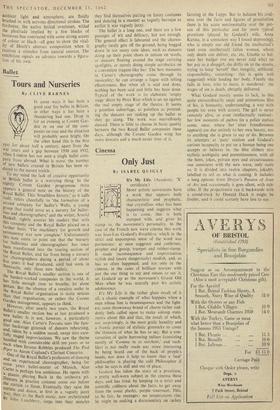Cinema
Only Just
By ISABEL QUIGLY MOST artistic movements have
a work that appears both characteristic and prophetic,
niter • that crystallises what has been happening and suggests what is to come, that is both stamped with, and gives 'its stamp to, the movement's personality. In the case of the French new wave cinema this work was Jean-Luc Godard's Breathless, which in the strict and unpompous sense of the word was portentous: at once suggester and confirmer, prophet and gossip, trumpet and rubber-stamp. It made inconsequence and improvisation stylish and (more dangerously) modish, and, as has so often happened, and not only in the cinema, in the cases of brilliant novices with just the one thing to say and means to say it, set Godard up as the movement's Grand Old Man when he was scarcely past his artistic adolescence.
It's My Life is the rather glum result of it all, a classic example of what happens when a man whose line is inconsequence and the light- est, most throwaway brand of charm rather sud- denly feels called upon to make solemn state- ments about this and that, the result of which, not surprisingly, is the most grisly banality and a frantic pursuit of stylistic gimmicks to cover the thinness of what he has to say. But a con- versation of quite harrowing tedium (consisting mostly of 'Conune to es niechant,' and such- like) is not really made any more interesting by being heard out of the back of people's heads, nor does it help to know that a 'real' philosopher is playing the café Philosopher if what he says is dull and out of place.
Godard has taken the story of a prostitute, a pretty well-worn subject in the cinema these days, and has tried, by keeping to a strict and scientific coldness about the facts, to get away from the usual plushy, purple treatment. This, to be fair, he manages: no temperatures rise, he might be making a documentary on turkey farming or the Lapps. But to balance his cool- ness over the facts and figures of prostitution there is his acute sentimentality over the per- son of this particular and far more typical prostitute (played by Godard's wife, Anna Karina, in a somnolent way I found depressing), who is simply our old friend the intellectual's (and even intellectual) fallen woman, whom only death can deliver, etc. etc. Unable to bal- ance her budget (we are never told why) on her pay as a shopgirl, she drifts on to the streets, trying to keep 'herself' (her integrity, selfhood, responsibility, something: this is quite well suggested) while lending her body. Finally she falls in love, tries to leave, is murdered: the wages of sin is death, abruptly delivered.
What Godard mostly seems to lack, in this quite extraordinarily inept and pretentious film of his, is humanity, understanding, a way with people (or even with actors). The girl is never remotely alive, or even intellectually realised: her few moments of pathos (in a police station scene, once, where her utter friendlessness appears) are due entirely to her own beauty, not to anything she is given to say or do. Between its attempts at 'pure' realism and Godard's curious incapacity to put on a human being one accepts or believes in, the film slithers into stylistic ambiguity and pretentiousness, with all the hints, jokes, private eyes and circuitousness one associates with the new wave, only more so. It is divided into twelve chapters, jokishly labelled to tell us what is coming. It includes a long episode from Dreyer's Passion of loan of Arc and occasionally it goes silent, with sub- titles. If the projectionist ran it backwards with a sound-track by Donald Duck it might be livelier, and it could scarcely have less to say.




























 Previous page
Previous page